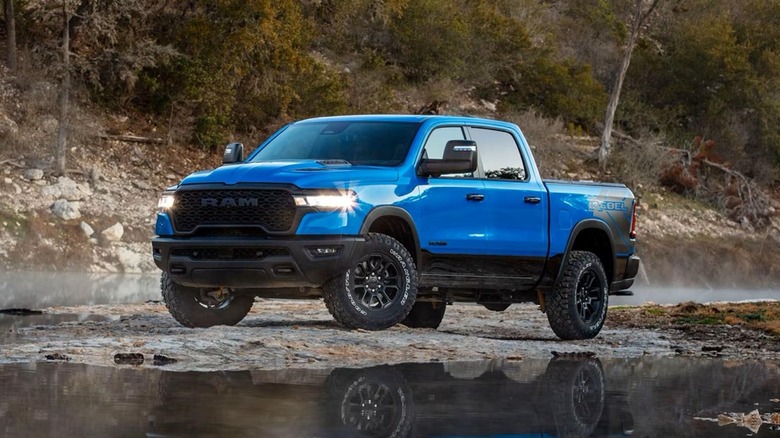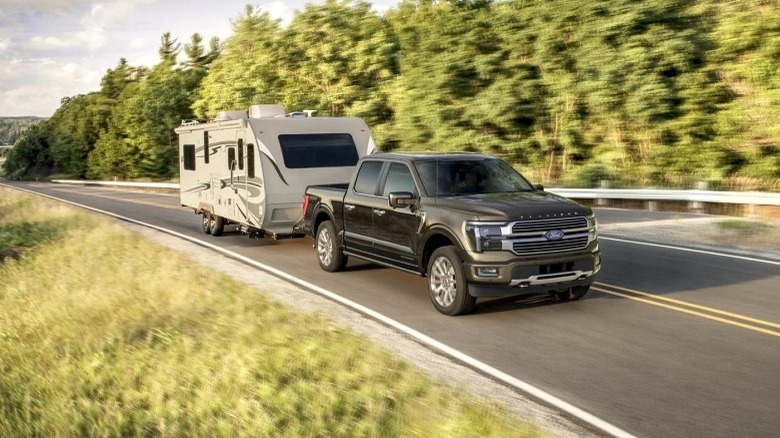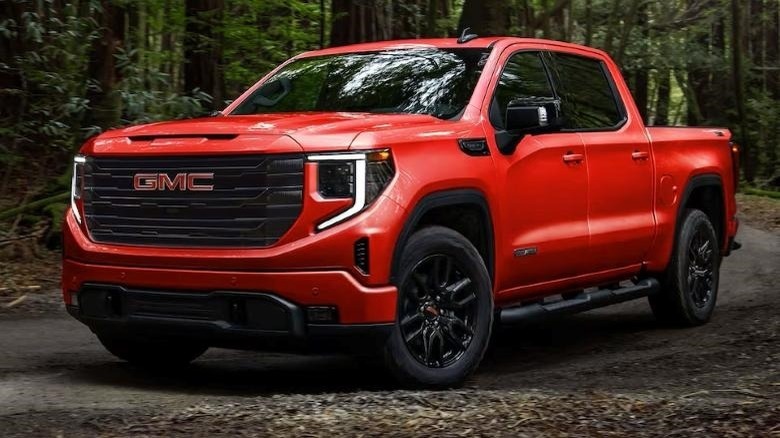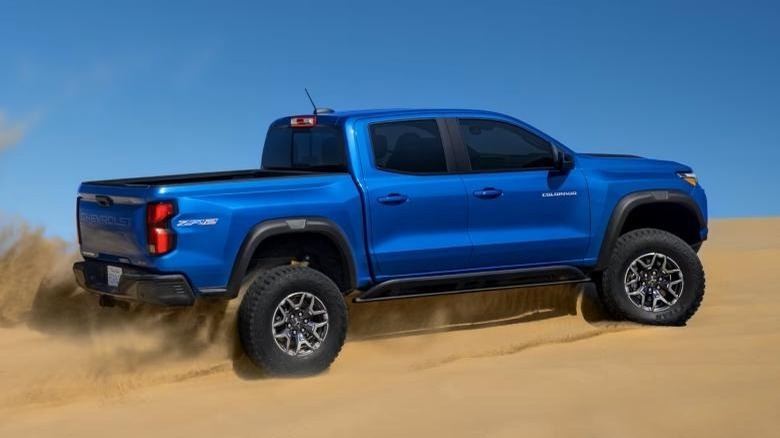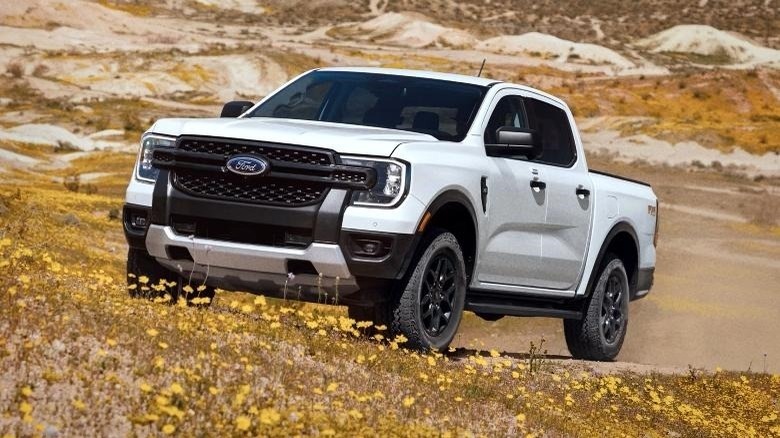Midsize Vs Full-Size Pickup Trucks: 4 Things To Consider When Shopping
America's love for trucks is a story that spans many decades, and it's easy to see why. They're durable vehicles with great levels of work capability, excellent for transporting families or traveling long distances, and possess rugged features that make them the go-to choice for those wanting to tackle extreme off-road terrain with ease. But, such adulation for trucks comes with a price (albeit a good one), such as manufacturers going all out to offer an overwhelming number of options, which can make deciding on the right truck a touch confusing.
To help, we've created this article as a buffer zone where you can find all the information you need to decide whether a midsize or full-size truck is right for you. As there are compelling trucks you can buy across both segments, the end game here isn't about which is the better truck class but rather which one is ideal for your specific needs. Also, for the sake of this article, we're only going to consider half-ton trucks such as the Ford F-150 and Silverado 1500, and not heavy-duty models like the Ram 2500 HD, Chevrolet Silverado 3500 HD, or Ford F-350 Super Duty (which also fall within the full-size truck segment). With that important context out of the way, here are four things to consider when trying to choose between a midsize and full-size pickup truck.
Size and capacity
Modern full-size trucks typically measure between 209 inches to around 253 inches in length, which makes them larger than their midsize counterparts, given the latter's average of 210-227 inches. This size difference allows full-size trucks to fit larger cargo beds, bigger engines, stronger frames, and ultimately offer higher towing and payload capacities. As a result, most gasoline-fed full-size pickup trucks are rated to tow 12,000 pounds and higher, with the likes of the Ford F-150 capable of pulling up to 14,000 pounds of weight when appropriately equipped. The payload ratings of full-size trucks are also substantial, with the majority able to carry up to between 1,940 and 2,530 pounds in their beds.
For midsize pickup trucks, towing capacity maxes out at around 7,700 pounds for most models, with the rest offering less capability. As for payload, most midsize pickup trucks carry around 1,700 pounds and below, save for the Ineos Grenadier Quartermaster and Ford Ranger, which are rated to tow 1,840 and 1,805 pounds, respectively. So, if you regularly tow over 10,000 pounds or carry around 2,000 pounds of weight or more, it will be beneficial to invest in a full-size pickup truck. Full-size trucks are also ideal if you're looking for a vehicle with generous passenger room, as their longer wheelbase allows for a more spacious interior. However, if you only tow around 6,000 pounds, occasionally carry a smaller load of no more than 1,600 pounds, or just want something more compact, a midsize truck will do just fine.
Power, performance, and efficiency
Now, because full-size trucks are heavier-duty and generally larger than their midsize counterparts, they tend to feature more powerful engines than the typical midsize pickup. The full-size Chevy Silverado 1500, for example, has a lineup of stout gasoline engines, including a 6.2-liter V8 that puts out 420 horsepower. In Car and Driver testing, a Silverado High Country with this engine bolted to 60 mph in an impressive 5.4 seconds. By comparison, the most powerful Chevy Colorado engine is a 310-hp turbocharged 2.7-liter inline-four found under the hoods of the Colorado Z71, Trail Boss, and ZR2 (this same 310-hp variety is also offered on the Silverado 1500, where it is the least powerful gas engine). In this case, the sprint to 60 mph takes a leisurely 7.1 seconds, according to a Car and Driver testing of a Colorado ZR2.
When it comes to fuel economy, midsize pickup trucks tend to be more efficient than full-size ones due to their smaller engines, although sometimes the difference can be negligible. Again, using the 2.7-liter Colorado and Silverado 1500 as an example, 2024 Colorado 2WD models return up to 20 mpg city, 24 mpg highway, and 22 mpg combined, per EPA data. 2024 Chevrolet Silverado 2WDs, for their own part, are good for 18 mpg city, 22 mpg highway, and 20 mpg combined. Hence, full-size trucks are great if you care about power, albeit at the cost of fuel economy. Midsize trucks, on the other hand, are the better option if you prefer a more efficient vehicle — although diesel-powered full-size truck owners might have something to say about it given their excellent fuel efficiency.
Lifestyle and adventure use
If you do a lot of off-roading, you'll find full-size and midsize pickup trucks to both be capable off the beaten path, provided they have the right equipment, and you have the driving skills. However, the ideal truck type for your use case will also depend on the sort of off-road terrain you frequent. For instance, an adequately equipped midsize truck should have little to no problems dealing with moderate off-road surfaces like dirt roads and trails, loose sand, ice, gravel, or even rocky terrain with moderate inclines. Also, because of their lighter weight, midsize trucks rarely get stuck, and when they do, they are easy to get unstuck.
However, when faced with more challenging situations like deep water crossings, muddy swamps, or extreme rock crawling, you'll find that full-size trucks do a better job at tackling those sorts of terrain due to a combination of their more powerful engines, higher ground clearance, heavier-duty axles, and differentials, as well as longer suspension travel and articulation. Not to mention, their bigger fuel tanks help provide increased range and longer driving time without needing to refuel.
Budget and cost
Ultimately, your decision on whether a midsize truck or full-size one is right for you will be based on what you can actually afford. If your budget maxes out at around $35,000, opting for a midsize truck will be your best bet, as they're the cheapest option and typically start under $35,000. A base-spec Chevy Colorado pickup truck, for instance, begins at $31,395 (MSRP). Stretch that by a tad, and you could pick up something a bit more competitive in terms of specs and features, such as a four-wheel-drive Colorado WT ($34,695, MSRP). Along with the four-wheel drive system, you're also getting an 11.3-inch touchscreen display, wireless Apple CarPlay and Android Auto smartphone integration, GM's Stabilitrak electronic stability control system, and more.
If you're not particularly concerned with what's within reach and are able to increase the amount you're willing to spend, you can consider adding a full-size truck to your list of options, as their manufacturer's suggested retail price (MSRP) ranges from just under $39,000 for a base model to well over $80,000 for a well-equipped full-size truck, all before options or delivery charges. Continuing with the Chevrolet theme, the 2024 Silverado 1500 starts at $38,795 (the 2025 model begins at $38,995), which translates into a $7,400 premium over the base 2024 Colorado, considering the latter's $31,395 starting MSRP. So, if price is not a factor, you can prioritize getting a truck that aligns perfectly with your ideal specifications, bearing in mind the factors above.
